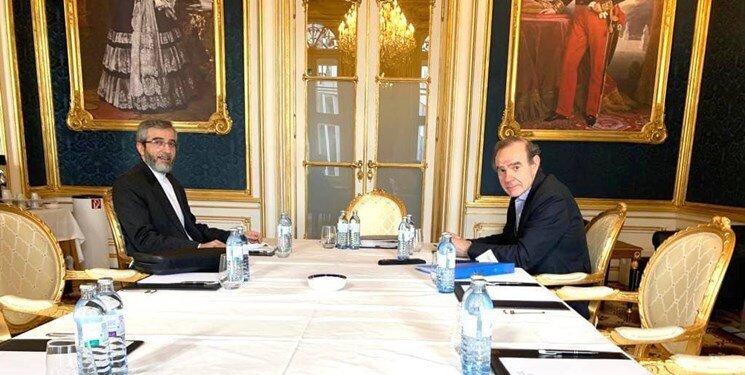Iran says Vienna talks will continue until a good deal is reached

TEHRAN- In a Twitter message, Iranian Foreign Ministry spokesman Saeed Khatibzadeh stressed that early positive news will not substitute a good deal in the current Vienna talks aimed at removal of illegal sanctions.
“Vienna Talks still continue. Premature good news does not substitute good agreement,” Khatibzadeh tweeted on Thursday.
“Nobody can say the deal is done, until all the outstanding remaining issues are resolved. Extra efforts needed. Everybody is now focused on the final critical steps,” he added.
The Iranian diplomat also emphasized that everyone's attention is now focused on the final important phases in the Vienna talks.
On Wednesday, Iranian Foreign Minister Hossein Amir Abdollahian stated that the Islamic Republic is making serious and active steps to nullify U.S. sanctions, in addition to diplomatic efforts in Vienna to eliminate them.
"The issue of neutralization and removal of sanctions is actively pursued and efforts are made to see the effect of government actions, initiatives and follow-ups in people's lives," Amir Abdollahian said on Wednesday, addressing a meeting with Iranian media directors at the Ministry of Foreign Affairs compound.
He also delivered a report on the current developments in the ongoing talks in Vienna.
In response to the developments in Ukraine, Amir Abdollahian clarified on Iran's perspective on the issue, as well as the Ministry of Foreign Affairs' measures and follow-ups involving Iranian nationals in the Eastern European country.
The media directors, for their part, expressed their perspectives and ideas on foreign policy, and the foreign minister responded to questions throughout the meeting.
On Thursday afternoon, Iran’s top negotiator Ali Bagheri Kani conferred with the European Union’s deputy foreign policy chief Enrique Mora in the Austrian capital as part of the eighth round of negotiations on the removal of anti-Tehran sanctions by reviving the 2015 Iran deal, officially known as the Joint Comprehensive Plan of Action (JCPOA).
The major contentious points discussed at the bilateral meeting were allegedly the extent of sanctions and the lifting of all bans placed on Iran as part of Washington’s so-called maximum pressure campaign against Iran. Among the other topics covered were the guarantees sought by the Islamic Republic in order to verify the lifting of sanctions, as well as lingering safeguards concerns between Iran and the International Atomic Energy Agency (IAEA).
In a tweet after the end of his talks with Iran’s negotiator, Mora said, “We are at the final stages of the Vienna Talks on JCPOA.”
Iran's top negotiator also met separately on Thursday with the Russian delegation in Vienna, which is led by Mikhail Ulyanov, the country's ambassador to international organizations in the Austrian capital. The two parties addressed the latest advances in the talks at the bilateral meeting.
Following the meeting, Ulyanov took to his Twitter account describing the past 11 months of JCPOA-related negotiations as a “long and grueling marathon,” and saying that the talks were “almost over.”
“Yesterday marked 11 months since the Vienna Talks started. A long and grueling marathon. Now it is almost over,” Ulyanov wrote.
On Wednesday, Secretary of Iran's Supreme National Security Council (SNSC) Ali Shamkhani stated that, in addition to attempts to lift the unlawful sanctions through the Vienna negotiations, Tehran has concentrated on rendering the embargoes ineffective.
Shamkhani made the statements while speaking to a special meeting of MPs about the latest developments in the talks between Tehran and the other parties to the 2015 nuclear accord.
During the meeting, Shamkhani emphasized the need to settle the remaining unresolved concerns, on which no consensus has been achieved thus far.
“The bitter experience of the U.S.’s non-commitment and the European inaction has made it inevitable to meet the requirements for the conclusion of a credible, balanced and lasting agreement,” he added.
“In addition to efforts toward sanctions removal, the country’s major strategy is to focus on creating mechanisms in order to render the sanctions tool ineffective. Fortunately, very good measures have been taken in this regard,” Shamkhani said.
The United States unilaterally withdrew from the historic nuclear agreement in May 2018 and reinstated the sanctions that had been removed as part of the agreement. Washington's European allies in the pact have been strictly toeing the sanctions line by ceasing trade with Iran.
Last April, Iran and the remaining JCPOA parties (Britain, France, Germany, Russia, and China) began talks in Vienna on the assumption that the U.S., under the Joe Biden administration, is prepared to abolish the so-called maximum pressure strategy.
Tehran has stated that it will not settle for anything less than the removal of all U.S. sanctions in a verifiable way. It also wants assurances that Washington would not withdraw from the deal again.
